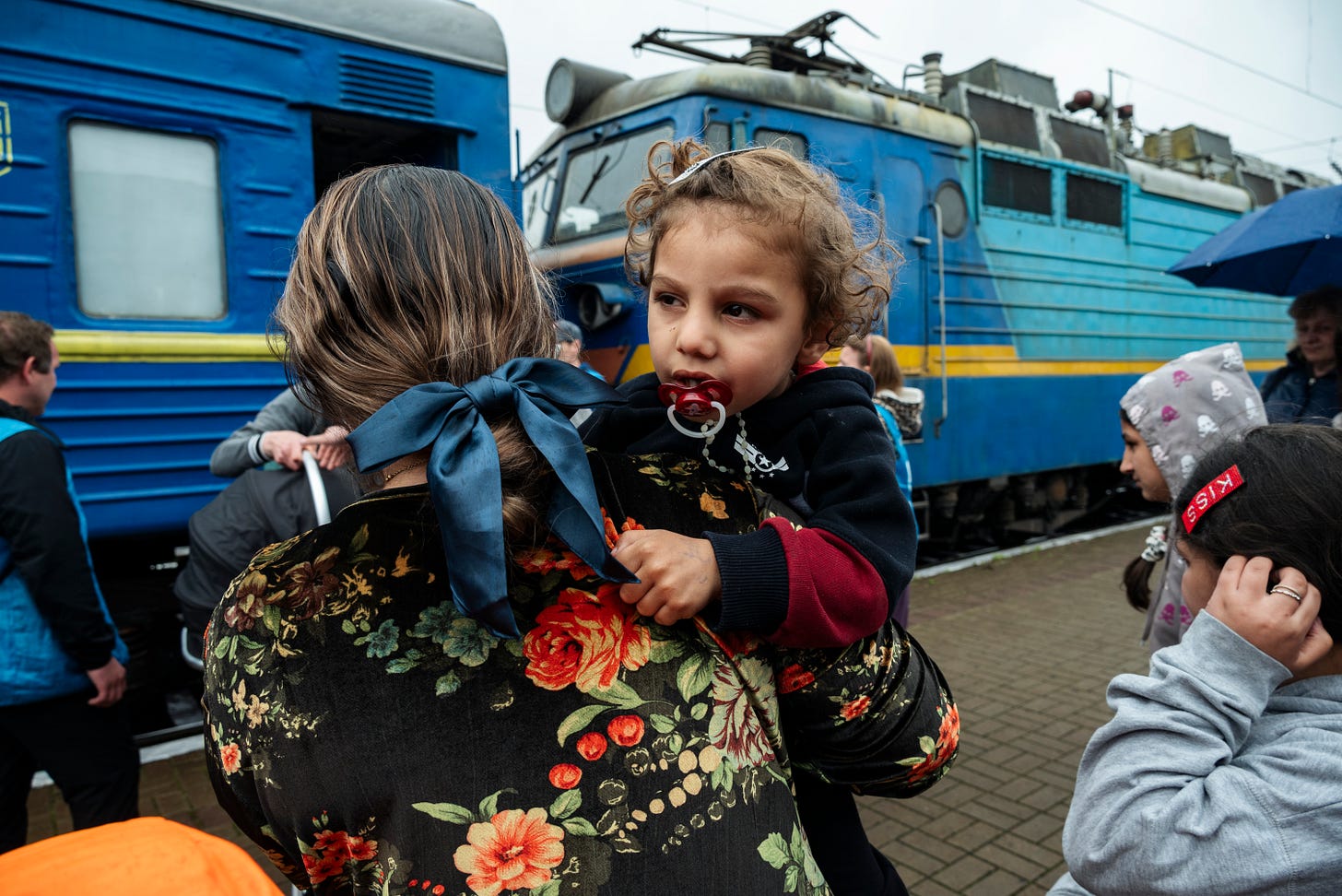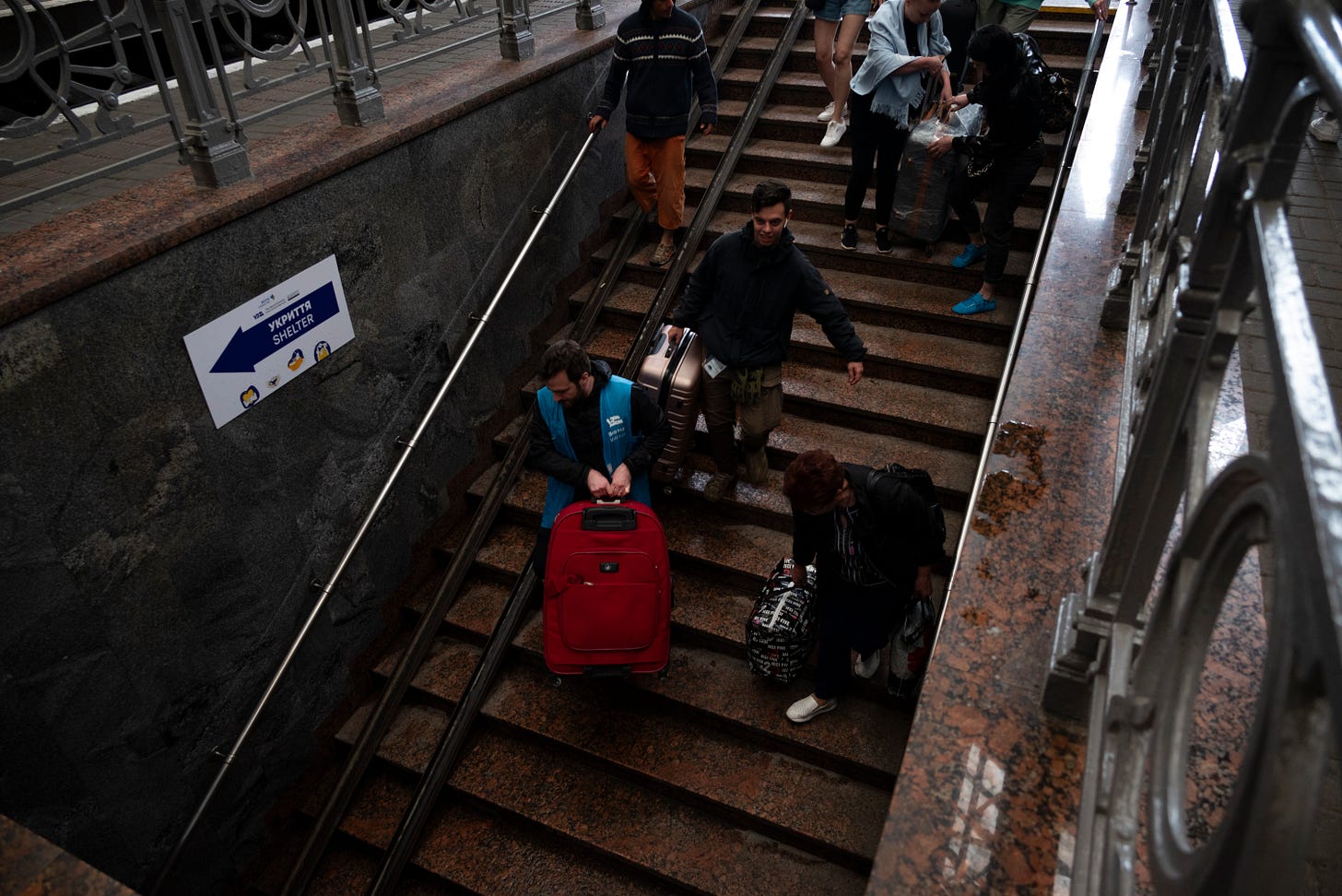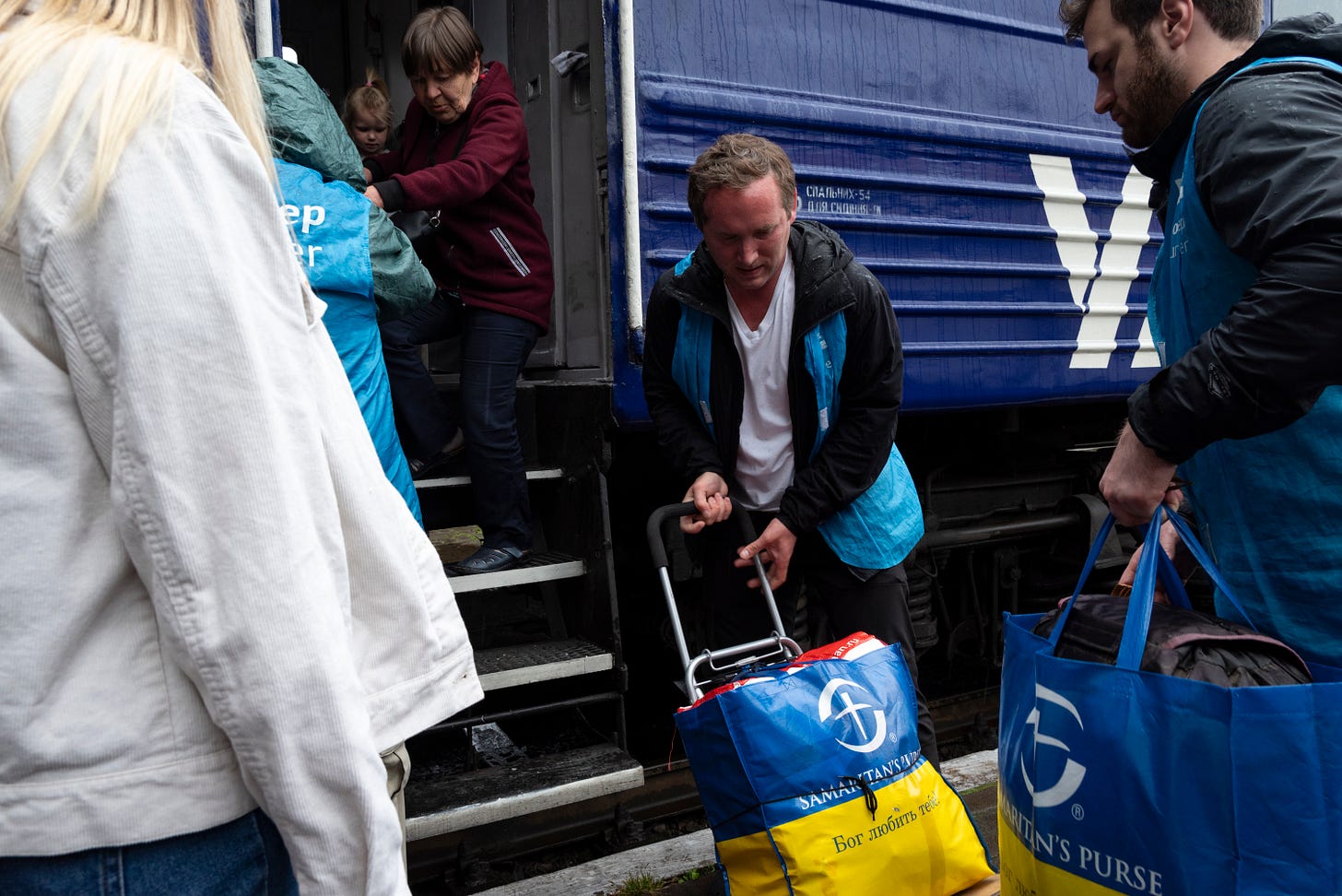1,001 Days
and how many more to go?
It’s been 1,001 days since Ukraine was officially invaded by Russia in the “special operation”.
In the dead heat of June I found myself crossing the eastern border of Poland into Western Ukraine. The low lying grasslands eased into gentle hills while the monolithic Mostiska-2 station glided into the foreground on the north side of the rail tracks. I never particularly expected to find myself in Ukraine, let alone during wartime but it seems that the winds of curiosity and conflict had delivered me there. On the train to Lviv I shared a sleeper car cabin with a Polish herpetologist, a Ukrainian tennis referee, and a German man on his way to work as an aid volunteer. The train reeked of sweat and heat, as the windows were nailed shut in case of the event of a missile blast. Over a hot glass of red chai and chocolate in the sweltering sticky train car, I spoke with the German, who was also named Alex, about his mission into Ukraine.
At the train station in Przemyśl while boarding the train I ran into a man with a pathetic rucksack and leather Teva flip flops, dressed in a loose checkered button up like a tourist heading to Redondo Beach. I asked him what he was doing, as I could see his Dutch passport clutched in his left hand. “Oh I’m going on vacation to Ukraine! I want to see what a country in wartime looks like!” he said with the nauseous excitement of that of a twelve year old on family vacation. I looked down at his flip flops carrying his clean smooth feet on the broken station platform and then back to my Chaco boots, breaking at the seams from years of abuse and hitch hiking. A mission in Western arrogance and apathy was his vacation.
Alex, who preferred the name Sasha, told me about his work as an aid volunteer with an organization called “Medical Psychology Help Lviv”. After a series of meetings, introductions, and a restless night, I found myself embedded with the organization for the better part of a week. The article and photographs that I wrote about them were never published, although I had promised Valentyn, the head of the organization, that I would have it in print. I felt like a fool for never having it in print, but this is exemplary of the failures and freedoms of a freelance journalist. The article below is the original article and photographs that I wrote, pitched, and never published. Originally only five photographs, I’ve expanded it to a modest eleven.
This is for you, Valentyn, and everyone in Lviv.
In an unused room at Lviv’s main train station, a group of students, foreign volunteers and local medical students have set up a small operation center to address critical needs for displaced people arriving from eastern Ukraine.
Founded only four days after the Russian invasion started, Medical Psychology Help was founded by a set of students studying clinical psychology at the medical university in Lviv. The group was initially founded to provide psychological help and crisis management for displaced people from front line areas in Ukraine as Valentyn Bordun, the group’s medical organizer, explained in his office that was crowded with wheelchairs and medical supplies. “How are people supposed to buy their groceries and go to work when their psychological needs are not met”.
The group started purely as a psychology and crisis management group to help those who recently arrived to process and help manage their situation. But it quickly changed to meet the wider needs of those who were coming to the train station. Many people who arrive at the train station from war torn regions don’t have basic amenities like fresh water, food, or sanitary items such as diapers and hygiene products and shelter. Volunteers have amassed bottled water, non-perishable foods, and an array of medical supplies from wheelchairs, crutches, hygiene products and other items to provide to people arriving from war torn areas of the country. They often help the elderly and those with disabilities, often carrying them through down the platform as the train station is not handicap friendly, making it difficult for the elderly to navigate the train station on their own.
Every morning group managers check the schedule for evacuation trains from Kherson, Zaporizhzhya and other cities close to the front lines. With mass flooding in Kherson and shelling throughout the Zaporizhzhya region, the volume of displaced people heading west has increased again, making Lviv station a main terminus for displaced peoples heading west. Volunteers help to unload evacuation trains, process people looking for help and provide crisis management sessions for those in need.
As an all-volunteer run organization, they have no budget and rely solely on donations of money and supplies. “Most of the funding goes toward the military...”, Valentyn explained, “this leaves the rest of society with little money.”. The group receives most of its aid through the donation of supplies and money and has around 200 volunteers, with two psychologists always on rotation, and not to mention many foreign volunteers from Germany, the United States, and other countries.
Andrew Loginsky, a medical student from Birmingham, Michigan, has been one of many Ukrainian-Americans volunteering with the group as well as with others in Poland, Ukraine, and Romania since the war started. “I couldn’t stand doing family medicine anymore and decided I wanted to focus on being an emergency room doctor," he explained on the train platform while smoking a cigarette. “This is the perfect opportunity to continue my medical training on the field, as well as working for a cause that’s close to me.”
They have also expanded to working with many other groups throughout the Lviv region. From working with the UNICEF children center also located at the train station to helping provide aid for The Home for Rescued Animals, a sanctuary for abandoned animals in the Kaiserwald neighborhood.
But Valentyn also confided in the stressors of living through the war. “Some mornings you’re sitting in the kitchen with your coffee and you just want to say fuck it. There's so much weight on your shoulders all of the time.”


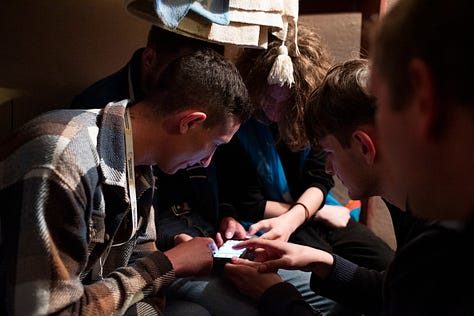

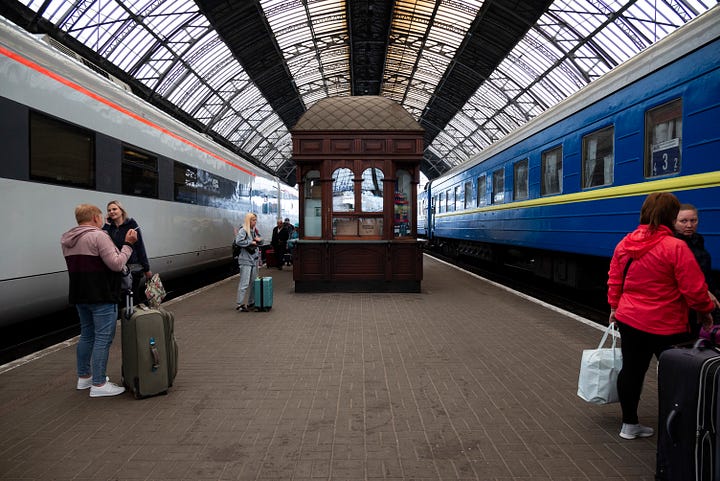
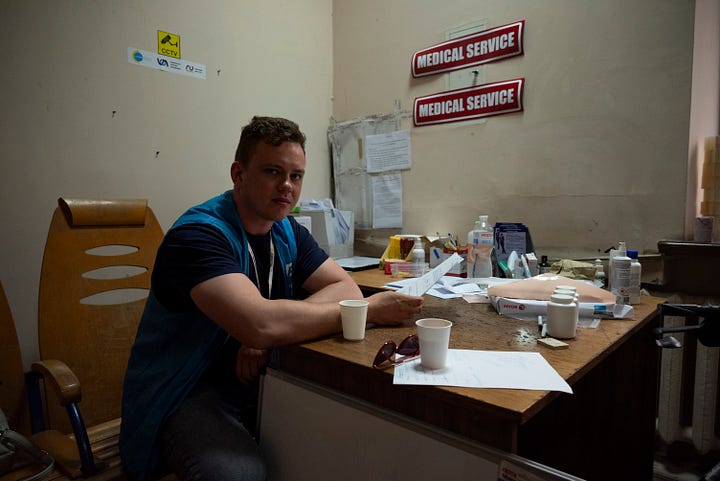
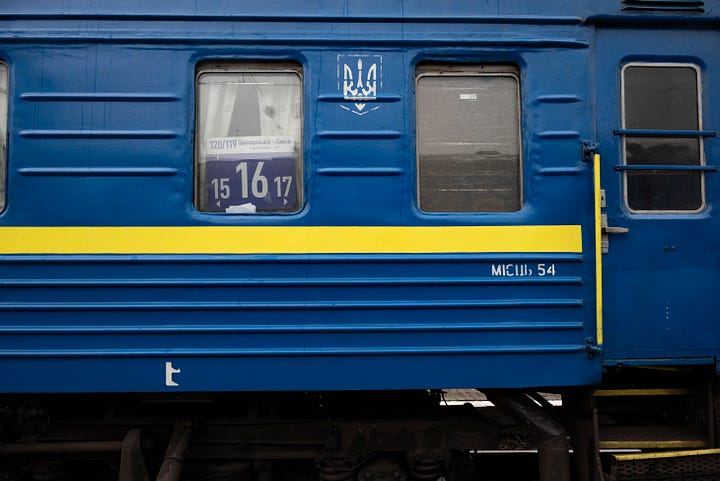
Thanks to Valentyn Bordun and everyone at Med Psy Lviv for being gracious enough to share their story with me. I would also like to thank Seth Herald for helping me edit and struggle to find a space for this piece of writing.


